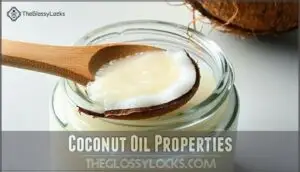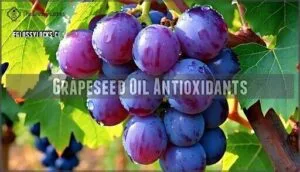This site is supported by our readers. We may earn a commission, at no cost to you, if you purchase through links.

Jojoba oil mimics your skin’s natural sebum, penetrating deep to restore moisture balance. Argan oil’s vitamin E and essential fatty acids repair damaged barriers while sunflower oil’s linoleic acid reduces water loss by up to 40%.
Unlike heavy moisturizers that sit on top, these plant-based oils actually heal from within. Coconut oil provides immediate relief for cracked skin, while avocado oil’s omega-3s calm inflammation.
The secret lies in their molecular structure—they slip between skin cells to deliver lasting hydration. Some surprising combinations work even better than expensive treatments, using natural oils and plant-based oils to achieve this.
Table Of Contents
- Key Takeaways
- Best Oils for Dry Skin
- Natural Remedies for Dryness
- Hydrating Oil Properties
- Skin Barrier Repair Options
- Clinical Evidence and Trends
- Frequently Asked Questions (FAQs)
- What is the best oil for severely dry skin?
- What is the best remedy for extremely dry skin?
- Which natural oil is hydrating?
- How often should I apply natural oils?
- Can natural oils cause allergic reactions?
- Should I patch test oils before use?
- Which oils work best for sensitive skin?
- Can I mix different natural oils together?
- Conclusion
Key Takeaways
- Choose linoleic acid-rich oils like jojoba, sunflower, or argan oil – they’re clinically proven to repair your skin barrier and reduce water loss by up to 40%, unlike heavy creams that just sit on the surface.
- Apply oils to damp skin twice daily for maximum absorption – the molecular structure lets them penetrate between skin cells to deliver lasting hydration from within rather than temporary surface relief.
- Start with jojoba or argan oil if you’re unsure – jojoba mimics your skin’s natural sebum perfectly, while argan oil’s vitamin E and essential fatty acids provide deep moisturizing with anti-inflammatory benefits.
- Always patch test new oils first – even natural oils can cause allergic reactions, so test on your inner wrist before applying to larger areas, especially if you have sensitive skin.
Best Oils for Dry Skin
When you’re dealing with extremely dry skin, choosing the right natural oil can make the difference between continued discomfort and lasting relief.
The top oils for severe dryness—including argan, coconut, jojoba, and sunflower—have clinical backing for their ability to repair your skin’s barrier and lock in moisture effectively, providing lasting relief.
Argan Oil Benefits
Throughout centuries of Moroccan tradition, argan oil stands as nature’s liquid gold for extremely dry skin.
Rich in linoleic acid and vitamin E, this powerhouse oil delivers deep moisturizing oils while supporting natural skin hydration.
Nature’s golden elixir penetrates deep to restore your skin’s natural barrier.
Its unique Argan Composition promotes elasticity improvement and aids scar reduction, making it ideal for skin barrier repair across face, body, and scalp health applications.
Argan oil is also known to reduce inflammation effectively, which can help with acne reduction and is beneficial for overall skin health, making it a great tool for skin hydration.
Coconut Oil Properties
Coconut oil stands out among natural skin hydration options thanks to its unique composition and proven efficacy.
With 45-56% lauric acid content, it delivers powerful emollient effects that rival mineral oil in clinical trials.
Studies show coconut oil increases skin moisture by 24.8% over four weeks, making it highly effective for xerosis improvement.
Its medium-chain fatty acids absorb quickly while forming a protective barrier for thorough skin barrier repair.
However, its comedogenic properties may clog pores for some users, which can be a consideration for skin hydration and overall skin health.
Jojoba Oil Hydration
Your skin produces a natural oil called sebum, and jojoba oil’s structure closely mimics this substance.
This sebum mimicry allows jojoba oil to maintain hydration balance across various skin types without clogging pores.
Its lightweight texture makes it an ideal non-comedogenic choice for facial oil applications.
Jojoba oil is also a great skin emollient, smoothing rough patches.
- Perfect sebum match: Jojoba’s molecular structure nearly identical to your skin’s natural oils
- Universal compatibility: Works effectively on dry, oily, and combination skin types
- Lightweight absorption: Penetrates quickly without leaving heavy residue or blocking pores
Sunflower Oil Advantages
Sunflower oil stands out among natural oils for dry skin with its high linoleic acid content, which supports superior skin barrier function compared to oleic acid-rich alternatives.
This lightweight oil provides effective TEWL reduction while delivering anti-inflammatory benefits through its vitamin E and phenolic compounds.
Clinical studies confirm sunflower oil’s ability to enhance skin hydration and strengthen the stratum corneum, making it an excellent choice for barrier repair without clogging pores.
Natural Remedies for Dryness
When your skin feels tight and flaky, targeted natural oils can provide immediate relief where regular lotions fall short.
These four powerhouse oils offer clinically-proven solutions that work deeper than surface-level moisture to restore your skin’s natural barrier.
Avocado Oil Moisturizing
Avocado oil creates a thick, protective layer that locks moisture into severely dry skin.
Rich in omega fatty acids and vitamins A and E, this powerhouse oil penetrates deeply to restore skin’s natural hydration levels.
You can find a great avocado oil moisturizer for your skin type.
- Occlusive Barrier Benefits: Forms a protective seal preventing water loss
- Chapped Skin Relief: Soothes cracked, flaking areas with intensive moisture
- Restoring Skin Moisture: Replenishes lipids for long-lasting hydration
Olive Oil Skin Barrier
Extra-virgin olive oil creates a protective moisture-barrier on your skin’s surface.
While olive oil lipids contain higher oleic acid levels, which can potentially disrupt barrier function in some people, many still experience improved skin hydration scores and TEWL reduction.
This natural oil works best for extremely dry, cracked areas where you need intensive repair rather than daily maintenance, providing a solution for intensive repair.
Grapeseed Oil Antioxidants
Grapeseed oil delivers potent Free Radical Scavenging through its high concentration of proanthocyanidins, making it your go-to choice for Environmental Damage Defense.
This lightweight oil provides Oxidative Stress Relief while supporting Skin Cell Protection without clogging pores.
Grapeseed oil can also strengthen brittle hair.
Why grapeseed oil fights dryness effectively:
- Proanthocyanidins Benefits – These powerful antioxidants neutralize free radicals that worsen dry skin conditions
- Superior absorption – Penetrates quickly, delivering antiinflammatory oils deep into skin layers
- Dual action – Functions as both skin soothing oils and skin hydration booster simultaneously
Clinical studies show grapeseed oil’s natural ingredients substantially improve moisture retention while protecting against environmental stressors that accelerate skin aging and dryness.
Evening Primrose Oil Inflammation
Evening primrose oil’s GLA benefits make it exceptional for inflammatory dry skin conditions.
This omega-6 fatty acid drives eicosanoid synthesis, promoting skin homeostasis through anti-inflammatory effects.
Studies show GLA suppresses inflammatory cytokines while supporting cellular repair, making it particularly effective for eczema relief.
| Property | Benefit | Research Finding |
|---|---|---|
| GLA Content | Anti-inflammatory effects | 8-15% concentration reduces inflammation markers |
| Cytokine Suppression | Skin soothing oils action | Decreases IL-1β, IL-6, TNF-α levels |
| Clinical Results | Natural remedy dry skin | 96% patient improvement vs 32% placebo |
Essential oils for skin like evening primrose work by converting GLA into anti-inflammatory compounds, making them valuable antiinflammatory oils for chronic dryness.
Hydrating Oil Properties
When you choose an oil for extremely dry skin, the specific fatty acid composition determines how effectively it’ll repair your barrier and lock in moisture.
Oils rich in linoleic acid like sunflower and safflower outperform oleic acid-heavy options for barrier repair, while vitamin E content provides the antioxidant protection your compromised skin needs to heal.
Linoleic Acid Content
When selecting natural oils for dry skin, you’ll find linoleic acid acts as your barrier repair champion.
This essential fatty acid strengthens ceramide synthesis and reduces TEWL while supporting skin hydration through inflammation modulation.
Top linoleic acid-rich dry skin oils include:
- Safflower oil – 70-74% linoleic acid content
- Evening primrose oil – 70-74% for facial oil applications
- Grapeseed oil – 65-70% in lightweight body oil formulas
- Sunflower oil – 61-71% among best oils for dryness
- Hemp seed oil – 60% natural oils for dry skin benefits
Oleic Acid Effects
Oleic acid benefits include enhanced skin permeability, though this fatty acid requires careful consideration for dry skin applications.
Higher oleic acid concentrations can compromise barrier function, while moderate levels support lipid profile balance and provide oxidative stability for natural oils.
| Oil Type | Oleic Acid % | Best Use |
|---|---|---|
| Olive Oil | 55-83% | Occasional treatment |
| Argan Oil | 43-49% | Daily moisturizing |
| Avocado Oil | 52-66% | Barrier repair |
| Sunflower Oil | 14-40% | Regular hydration |
Research shows oils with balanced oleic content offer inflammation modulation properties while maintaining skin hydration effectiveness.
You’ll find moderate oleic acid levels work best for consistent skin moisturization without overwhelming your skin’s natural protective mechanisms.
Vitamin E Benefits
Vitamin E acts as your skin’s personal bodyguard against daily damage.
This powerful antioxidant strengthens cellular health while promoting natural skin repair processes. Many eczema relief oils contain vitamin E for its proven therapeutic benefits. Vitamin E can also provide anti-inflammatory effects on the skin.
Here’s how vitamin E transforms extremely dry skin:
- UV Protection – Shields skin cells from sun damage and environmental stressors that worsen dryness
- Scar Reduction – Accelerates healing of cracked, damaged skin while preventing permanent scarring
- Antioxidant Properties – Neutralizes free radicals that break down your skin’s natural moisture barrier
Fatty Acid Composition
The fatty acids in natural oils determine how well they’ll work for your extremely dry skin.
Linoleic acid-rich oils like sunflower and safflower offer superior skin barrier function and faster oil absorption rates compared to oleic acid-dominant options.
These bioactive compound effects enhance skin cell interaction, promoting better skin hydration and nourishment for lasting moisturization.
Skin Barrier Repair Options
When your skin barrier is compromised by extreme dryness, choosing the right repair method becomes essential for lasting relief.
Cold-pressed oils with specific fatty acid profiles can restore your skin’s protective barrier while reducing water loss by up to 20% in clinical studies, providing lasting relief.
Cold-Pressed Extraction
Cold-pressed extraction preserves lipid preservation and bioactive compounds that heat destroys.
This gentle process maintains nutrient retention, unlike harsh solvent extraction methods. Temperature effects matter – you’ll get more skin-nourishing compounds when natural oils for skin aren’t exposed to high heat.
These preserved nutrients make cold-pressed oils superior for dry skin treatment and organic skin care applications.
Many users find that ceramides aid repair of the skin’s natural barrier, which is an important aspect of organic skin care.
Plant-Based Oil Benefits
Plant-based oils work like nature’s repair crew for your damaged skin barrier.
These natural moisturizers contain lipid composition that matches your skin’s needs perfectly.
Here’s how they restore your barrier:
- Replenish intracellular lipids – strengthening your skin’s protective layer
- Reduce water loss – keeping moisture locked in naturally
- Support sustainable sourcing – delivering consistent oil bioactivity
Traditional uses prove these organic skin care solutions provide lasting skin nourishment.
Ceramide Production Stimulation
Your skin’s natural repair system relies heavily on ceramides, the lipids that lock in moisture and strengthen your barrier function.
Oat oil delivers impressive results, boosting ceramide levels by 70% in clinical studies.
Sunflower and evening primrose oils provide essential linoleic acid that directly supports lipid synthesis.
These natural oils for dry skin work by supplying fatty acid building blocks rather than adding ceramides directly, making them particularly effective for sensitive skin oils and thorough skin nourishment.
Trans-Epidermal Water Loss Reduction
Natural oils create an occlusive barrier that dramatically reduces trans-epidermal water loss, helping your skin retain precious moisture.
These noncomedogenic oils support lipid replenishment while improving skin permeability control.
Hydration measurement studies show significant improvements in sensitive skin oils users, and environmental factors can’t penetrate as easily when you’ve got proper oil for cracked skin protection, making skin repair faster and more effective with proper oil.
Clinical Evidence and Trends
You’ll find that clinical trials consistently back up what dermatologists have recommended for years – natural oils really work for extremely dry skin.
The market reflects this trust, with facial oils becoming one of the fastest-growing skincare categories as more people discover these evidence-based solutions.
Facial Oil Consumer Preferences
You’re joining a growing movement toward organic formulations and natural skin care.
Facial oil for dry skin has become mainstream as consumers prioritize safe ingredients over synthetic alternatives.
- 92% of moisturizing facial oils use plant-based ingredients as their primary component
- Fast-growing trend in organic skin care targeting chronic dry skin management
- Cost-effective alternatives deliver faster skin relief compared to traditional moisturizers
- Consumer preference shift toward natural skincare routine products for skin hydration
Dermatological Recommendations
Dermatologists increasingly recommend natural oil intervention for dryness management, citing them as safe options for chronic dry skin conditions.
About 79% of dermatological recommendations mention at least one natural alternative when treating eczema, psoriasis, and dermatitis.
These experts favor cold-pressed oils over processed alternatives, emphasizing their proven efficacy in clinical dermatology practice.
Market Analysis and Growth
You’ll find the natural oils market booming, with facial oils hitting $3.5 billion in 2025 and body oils reaching $4.9 billion by 2034.
Consumer demand drives product innovation as 70.7% of users seek multipurpose skincare solutions.
The competitive landscape favors brands offering clean, plant-based formulations. Future trends point toward personalized dermatology-backed skin care products targeting specific moisturization needs for ideal skin health.
Clinical Trial Validation
Research backs up what you’ve been hearing about natural oils.
Multiple randomized controlled trials prove these remedies work for extremely dry skin conditions.
Here’s what Study Design reveals about Oil Efficacy:
- Hydration Scores increased 30% within 30 minutes using jojoba oil
- Barrier Function improved substantially with sunflower seed oil applications
- Consumer Safety matched mineral oil standards across all tested oils
- body oil for dry skin reduced water loss by 68% in pediatric eczema cases
- hydrating skin treatment with argan oil showed measurable improvements over two months
Clinical skin care research validates organic skin oils and oil for cracked skin as reliable moisturizers.
Frequently Asked Questions (FAQs)
What is the best oil for severely dry skin?
Don’t put all your eggs in one basket—try multiple oils.
For severely dry skin, you’ll want argan oil‘s vitamin E and fatty acids.
Coconut oil provides excellent moisture retention with proven clinical results comparable to mineral oil for xerosis conditions.
What is the best remedy for extremely dry skin?
You’ll want to combine multiple approaches for the best results.
Use thick, occlusive oils like coconut or avocado oil immediately after bathing to lock in moisture and restore your skin’s protective barrier function.
Which natural oil is hydrating?
Jojoba oil’s your hydrating hero—it mimics your skin’s natural sebum perfectly.
Coconut oil delivers deep moisture with vitamin E and fatty acids.
Sweet almond oil provides lasting hydration with vitamins A and E for comfortable skin, and it can be considered a hydrating hero with vitamins.
How often should I apply natural oils?
Apply natural oils twice daily—morning and evening—to extremely dry skin.
Consistency matters more than quantity.
Use a thin layer, allowing absorption between applications.
Adjust frequency based on your skin’s response to achieve the best results with consistency.
Can natural oils cause allergic reactions?
Yes, natural oils can trigger allergic reactions. You might experience redness, itching, or swelling from certain oils like coconut, almond, or argan. Always patch-test new oils first.
Should I patch test oils before use?
You should always patch test oils before applying them to larger skin areas.
Even natural oils can trigger allergic reactions or irritation, so testing on your inner wrist first helps prevent adverse reactions, including those from natural oils.
Which oils work best for sensitive skin?
For sensitive skin, you’ll want gentle, non-comedogenic oils that won’t trigger irritation.
Jojoba oil mimics your skin’s natural sebum, making it ideal for sensitive types.
Sweet almond and sunflower oils offer lightweight hydration with minimal reaction risk, making them a good choice for skin that needs gentle care, and they are also non-comedogenic.
Can I mix different natural oils together?
You can definitely blend natural oils to create custom moisturizing treatments.
Start with lighter oils like jojoba as your base, then add heavier ones like coconut or argan oil for extra nourishment.
Conclusion
Finding relief starts with choosing the right oil, applying it consistently, and trusting the process.
Natural oils for extremely dry skin deliver results that synthetic moisturizers simply can’t match. These plant-based solutions work at the cellular level, repairing your skin barrier while providing immediate comfort.
You’ve got eight proven options that dermatologists recommend. Start with jojoba or argan oil tonight, and you’ll notice softer, healthier skin within days. Your sandpaper skin will become smooth again.
- https://integrishealth.org/resources/on-your-health/2021/september/natural-oils-for-skin-care
- https://www.gminsights.com/industry-analysis/skincare-oil-market
- https://www.dermstore.com/blog/natural-oil-for-dry-skin/
- https://www.orthofyto.com/wp-content-orthofyto/uploads/2018/08/vaughn2017huidolienieuwsberichtOFWK34-bij-plantolie.pdf
- https://midwifery.iocspublisher.org/index.php/midwifery/article/download/769/708/














